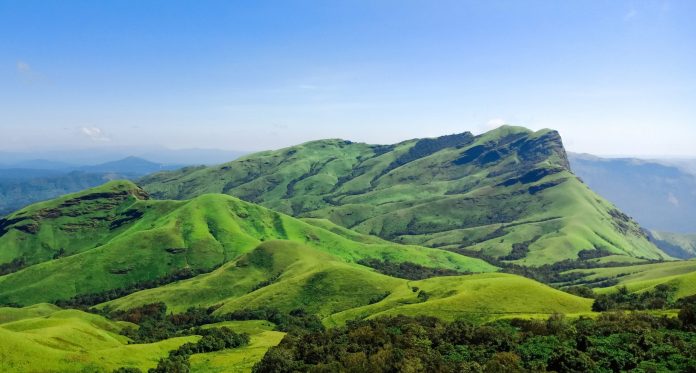Introduction
Beautiful rolling green hills, mist curling around densely forested hills and a cool and soothing ambiance are all a part of Kudremukh Trek. Being the third highest peak in Karnataka, it has an elevation of 6,206 feet above sea level. Due to its natural splendor, it is also called ‘Himalayas of the South’. The word ‘Kudremukh’ means ‘horse face’ in Kannada. The mountain is named so because of its uncanny resemblance to that of a pony.
The broad mountain range overlooks the Arabian Sea, and is connected in a chain like manner to one another by steep valleys and deep precipices. The trek has largely been untouched by many tourists and trekkers due to it being away from limelight. It is widely believed that Kudremukh served as a landmark for sailors more than two thousand years ago.
The trek to Kudremukh can be started at Chikmagalur. Being at Kudremukh, the first thing to do is head over to the Kudremukh National Park.
The fees for entry in the National Park is Rs. 200 per person for Indian citizens and Rs. 1000 per person for foreign tourists.
The Kudremukh National Park has a variety of wildlife, including but not limited to leopard, Malabar giant squirrel, sloth bear, spotted deer, mongoose, porcupines and even tigers can be spotted.
The trek to the Kudremukh peak typically takes five hours, and it is highly recommended that guests begin this journey before ten in the morning. The complete trek, to and from the peak, is a total distance of twenty two kilometers, which is more than eighteen hundred feet. The trek is of moderate difficulty. It is a perfect trekking spot from Bangalore, for a weekend getaway.
While on the trek, trekkers witness many amazing sights, with narrow streams and cascading waterfalls.
The natural splendor of the Western Ghats can be seen in this place in its fullness, with sights that might amaze anyone.
Kudremukh Trek starts from a forest check post in the small village of Mullodi Hills, which is at the distance of ninety six kilometers from Chikmanglur. It starts with muddy tracks, hence it is recommended that tourists wishing to trek should wear hiking boots. The muddy path gradually turns into plateaus which are mostly picturesque meadows, grasslands and flatlands. The scenery on the trek keeps on changing and will surely amaze trekkers with breathtaking views of the Western Ghats. It is a lesser known fact that Western Ghats are considered a UNESCO World Heritage Site, known for its exquisite ecosystems and conserved biosphere.
The best time to visit Kudremukh is after the monsoon season has passed. The trees are beautifully lush and green, and waterfalls like Kadambi waterfalls, Hanuman Gundi waterfalls and the rivers and streams are teeming with fresh water.
The permissions for forest trekking in Kudremukh have changed as of recently. Only fifty participants are allowed at one time to venture into this mountain range which also happens to be a preserved biosphere. In the worst case scenario, if your trekking permit gets disallowed, you can head over to other beautiful treks such as Kurinjal or Bavikonda, which are in the same region.
Camping is not allowed in this region, hence all tourists must return before sunset.
More than two hundred species of bird live or migrate here, making this place a birdwatching heaven, specially during migration season.
Although there are several streams present which guests might encounter during the trek, it is highly recommended that guests bring their own mineral water for health and hygiene purposes.
Listening to flowing streams and birds flitting about makes this place a soothing, cool and calm place that one can get away to escape the hectic city life. During the trek, the Kudremukh Peak grows more and more magnificently noticeable as one moves toward it.
The last part of a train is a zig-zag after which guests reach the peak of Kudremukh, where the views are out of this world. The views here might remind one of Scotland, or maybe even Lord of the Rings. Reaching the peak might take a lot of the afternoon, and one can enjoy a late afternoon packed lunch with picturesque scenery.
After spending some time on the peak, the descent must start. This might take about 3.5 to four hours, as then the trek is mostly a downward descent. After reaching the base camp, guests can have dinner, and enjoy the amazing local Kannada cuisine as well as singing and dancing along with other patrons with a bonfire.
With an overnight stay and a replenishing breakfast, guests can begin making their journey home.
Checkout: More awesome Content


